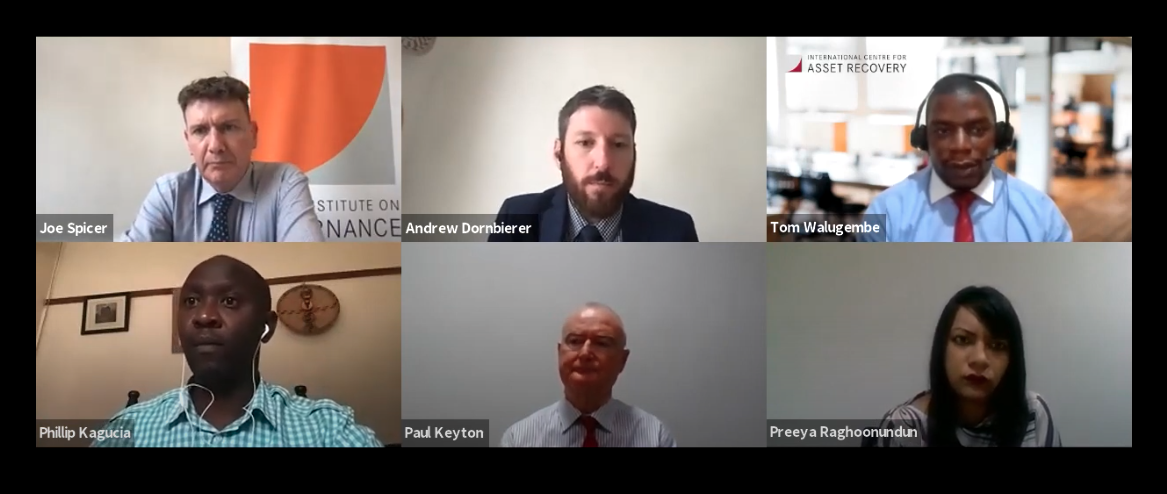Are illicit enrichment laws an underused tool to target corruption? Yes, say practitioners

At a Basel Institute-hosted webinar on illicit enrichment on 30 June 2021, practitioners from Uganda, Kenya and Mauritius agreed that illicit enrichment laws have significant potential to help their countries – and others – target corruption and recover stolen assets. But, they say, significant hurdles still need to be overcome, especially in transnational cases.
In a nutshell, illicit enrichment laws or unexplained wealth laws allow investigators and prosecutors to recover assets that have clearly not come from lawful sources without having to prove the specific criminal action that gave rise to these proceeds.
As such, they are particularly useful to target corruption offences, where it is often difficult to point to an obvious victim or to a specific criminal act.
So why aren’t they being used more often and more widely? Read on.
About the event
The panel discussion sought to explore what we can learn from countries that have introduced these types of laws around the world, what States should consider when introducing illicit enrichment legislation, and how to overcome challenges to its effective application.
The event was also an opportunity to introduce a new open-access book on Illicit Enrichment: A Guide to Laws Targeting Unexplained Wealth written by Andrew Dornbierer and published by the Basel Institute in June 2021. Andrew Dornbierer spoke on the panel alongside:
- Phillip G. Kagucia, Assistant Director, Ethics and Anti-Corruption Commission, Kenya
- Paul Keyton and Preeya Raghoonundun, Director and Assistant Director, Integrity Reporting Service Agency, Mauritius
- Tom Walugembe, Asset Recovery Specialist, Basel Institute on Governance
Jonathan Spicer, Senior Asset Recovery Specialist at the Basel Institute on Governance, moderated the event.
The virtual event welcomed 140 live attendees. You can view it on YouTube here or listen to the audio recording.
Introducing illicit enrichment
Andrew Dornbierer began by outlining how illicit enrichment can be defined at a broad level as referring to a situation in which:
“someone has enjoyed an amount of wealth that is not justified by reference to their lawful income.”
He explained that an illicit enrichment law is one that targets this situation, and will empower a court to sanction someone for illicit enrichment without needing to see proof of any underlying or separate crime that gave rise to the enrichment.
Andrew further explained that laws targeting illicit enrichment can be in both criminal formats (i.e. in the form of a criminal offence) or civil formats (i.e. as an application process for a civil order for compensation).
Significant variety across jurisdictions
Tom Walugembe, Phillip G. Kagucia, and Preeya Raghoonundun explained the unique formats of the illicit enrichment laws in Uganda, Kenya and Mauritius respectively.
While Uganda has implemented a criminal offence for illicit enrichment, contained in the primary anti-corruption law, Kenya and Mauritius have both enacted civil-procedure based laws. Civil actions under Kenya’s law are also outlined in the country’s primary anti-corruption act, but instead take the form of a civil order that can be made by courts to confiscate “unexplained assets”.
In Mauritius, the civil action can be applied more broadly outside of an anti-corruption context. However, before the court action can be launched by the Integrity Reporting Service Agency, it must first receive approval from an independent board that assesses the strength of a potential case.
Successes and overcoming hurdles
The experts explained that while each of the countries has achieved some success in the enforcement of illicit enrichment laws, practitioners still face many hurdles in their efforts.
For instance in Uganda, capacities regarding financial investigation abilities have hindered the strengths of certain cases. Meanwhile in Kenya, some misunderstandings regarding how the law should be investigated and applied have led to significant delays in the court – though these misunderstandings have been somewhat clarified as court cases have progressed.
In Mauritius, Paul Keyton explained that the ability of respondents to take advantage of procedural loopholes, without consequences, can add severe delays to proceedings.
Legal challenges to illicit enrichment
To provide some further insight into the common legal challenges that illicit enrichment laws often face, Andrew Dornbierer discussed arguments that illicit enrichment laws contravene the presumption of innocence principle. This is a basis for many challenges around the world.
He explained that while most courts admit that these laws run contrary to this principle, the prevailing view around the world is that this principle is not absolute in nature, and that illicit enrichment laws qualify as an acceptable deviation from this principle for a number of reasons.
Tom Walugembe provided further insight on other legal arguments that often arise, specifically that illicit enrichment laws violate property rights as well as the principle against retroactive application, and explained how Ugandan courts have rejected both of these contentions.
How does illicit enrichment work across borders?
Attendees raised many interesting questions, especially regarding difficulties in freezing assets or obtaining evidence from abroad in the context of illicit enrichment cases.
In response, Tom Walugembe noted that as many countries in Europe do not have illicit enrichment laws, there are likely to be issues regarding dual criminality that will affect efforts to obtain mutual legal assistance from these countries.
Paul Keyton explained that in Mauritius, value-based provisions in the law may still facilitate asset recovery when it is impossible to confiscate goods from foreign states due to a reluctance in that country to cooperate.
Learn more
- See Andrew Dornbierer’s quick guide to illicit enrichment, also available in French, Spanish and Portuguese.
- Learn more about our new book on Illicit Enrichment: A Guide to Laws Targeting Unexplained Wealth by Andrew Dornbierer. Click through to Amazon to purchase a print copy at cost price or visit illicitenrichment.baselgovernance.org to view or download the full book, technical guidance on source and application analysis, and a database of illicit enrichment laws around the world.
- Read a case study by Tom Walugembe on the landmark USD 1.25 million illicit enrichment case of Uganda vs. Geoffrey Kazinda in October 2020.



